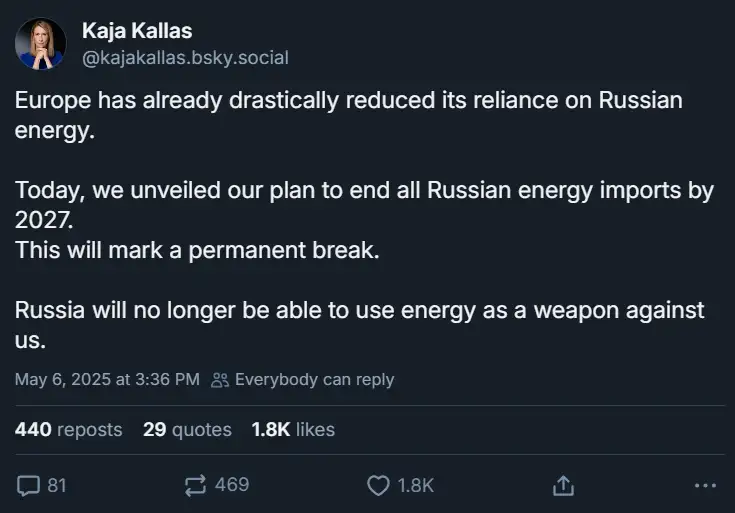Brussels — In a bold statement, EU High Representative Kaja Kallas declared, “Russia will no longer be able to use energy as a weapon against us.” The message was clear: Europe is determined to free itself from Russian energy dependence. But the reality behind that statement is far murkier—and many argue it reeks of double standards.
As the European Union distances itself from Kremlin gas, it has increasingly leaned into partnerships with Azerbaijan, an authoritarian regime with a dismal human rights record. On the surface, this move seems strategic—a pivot away from Russia. But deeper scrutiny reveals that the gas Europe now buys from Azerbaijan is often the same Russian gas, just routed differently.

Here’s the contradiction: the only active Azerbaijani gas field supplying the EU, Shah Deniz, is partially owned by Russian gas giant Lukoil. Even more alarming is the quiet but growing re-export trade—Azerbaijan importing Russian gas and selling it to Europe under its own flag. It’s a geopolitical shell game, and the EU is a willing player.
While supporters argue that Azerbaijan hasn’t invaded any European countries, the ethical lines remain blurred. This isn’t just about sovereignty or war—it’s about funding regimes with track records of oppression, all while claiming moral high ground in the global energy transition.
The EU says its goal is full independence from Russian fossil fuels by 2027. But critics are quick to point out the inconsistency. The war in Ukraine began in 2014. Nearly a decade later, Europe is still mapping out a path to stop indirectly financing it—through tangled energy flows and convoluted trade routes.
Eastern European countries, especially those more economically vulnerable, have borne the brunt of this slow transition. Attempts to cut off Russian gas quickly would’ve caused energy prices to skyrocket, devastating low-income households and fragile economies. The pain of the transition is real—but so is the delay in decisive action.
Then there’s the question of alternatives. Canadian LNG and oil are often floated as viable options. But Canada’s infrastructure isn’t ready. It lacks significant LNG export capacity on its east coast, and its pipeline network remains heavily dependent on routes through the United States. The long-discussed “Energy East” pipeline, which would connect Alberta’s oil to Atlantic export terminals, hasn’t even broken ground.
So, while leaders like Kaja Kallas present the EU as charting a bold new course, the facts on the ground suggest otherwise. Europe may be buying less gas directly from Russia, but it hasn’t fully escaped the Russian energy shadow. The map has changed—but the money flows continue.
Until the EU makes a clean break—not just from Russian supply, but from fossil-fueled geopolitical entanglements altogether—claims of energy sovereignty ring hollow. A roadmap isn’t a result, and partnerships with autocrats, however expedient, can’t be disguised as moral victories.